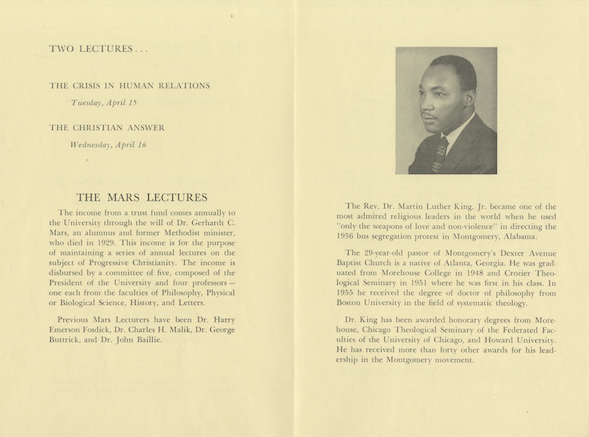EVANSTON - A decade before Rev. Martin Luther King Jr. was assassinated in Memphis, the civil rights leader gave two lectures in 1958 at Northwestern University, telling students the moral path to integration was through non-violent resistance.
He drew a standing ovation from an overflow crowd, most of them students, at one lecture in Tech. Witnesses commented on how his two lectures were delivered like sermons, but their intelligence and reasoning impressed the crowd.
The nation is commemorating the 50th anniversary of King’s assassination today, April 4, after five decades of remarkable milestones and significant setbacks on the path toward the dream that King extolled.
King was fatally shot on April 4, 1968 at the Lorraine Motel in Memphis after delivering his famous “I’ve Been to the Mountaintop” speech in support of striking black city workers who were paid lower wages than whites. He had been delayed in his travel by a bomb threat, but King was unafraid and undeterred.
“I may not get there with you,” King said. “But I want you to know tonight, that we, as a people, will get to the promised land.”
Ten years earlier, on April 15 and 16, 1958, King had a similar message for a standing room only crowd at Northwestern University’s Tech Auditorium.
“If you can’t fly, run. If you can’t run, walk. If you can’t walk, crawl. But whatever you do keep moving,” King said, urging those in attendance to join the effort to end segregation.
Two years after King rose to national prominence as a civil rights leader in the wake of the 1956-57 Montgomery Alabama bus boycott, the iconic civil rights hero visited Northwestern’s Evanston campus to deliver two lectures, "The Crisis in Human Relations" and “The Christian Answer.”
“The audience, which kept filing into Tech auditorium until it overflowed fully a half hour after King started his lecture, was dead silent as the minister closed his lecture,” wrote Sam Jameson, assistant managing editor of the Daily Northwestern, in a column about King’s lecture.
Among the most tumultuous times of the 20th century, 1968 also saw athletes at the Olympic games raise fists in a salute to Black Power, the assassination of Robert F. Kennedy, the Tet Offensive in South Vietnam and riots during the Democratic National Convention in Chicago.
And on the Northwestern campus, less than a month after King’s assassination, more than 100 Northwestern students peacefully occupied the Bursar’s Office to protest racial insensitivity on campus. The occupation lasted 38 hours, ending with a negotiated resolution in which the administration responded to a list of fifteen student demands.
Northwestern University announced Feb. 14 it is making funding available for student groups, departments, centers and units planning events this academic year to commemorate the 50th anniversary of the May 3, 1968 Bursar’s Office Takeover.
The University’s Office of Institutional Diversity and Inclusion (OIDI) is offering funding of up to $2,500 to support events and programming related to the 50th Commemoration of the Takeover, a significant event in the University’s history.
To be eligible for funding, the event or program must have an educational or inspirational mission directly related to the 50th anniversary and take place between February and May 2018.
Funding applications will be accepted through April 30.
The May 3, 1968 occupation of the Bursar's Office, the first major sit-in at Northwestern, ended with University leaders committing to enhance services and support for black students related to admissions, scholarships, housing, curriculum, counseling and facilities -- which led to the creation of the African American Studies Department and the establishment of the Black House.


